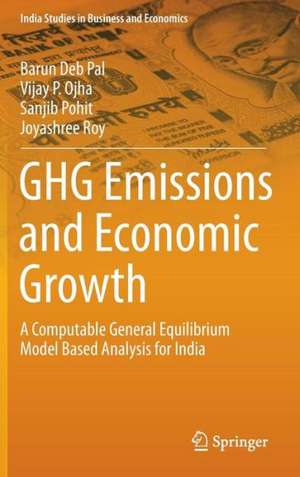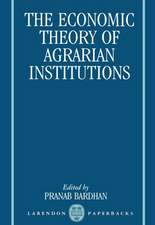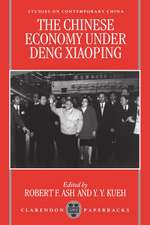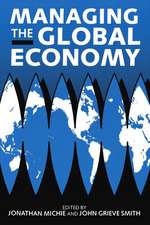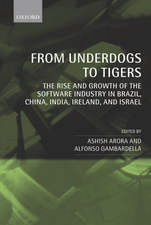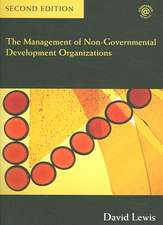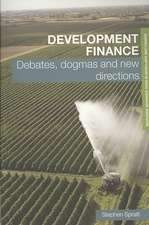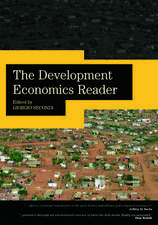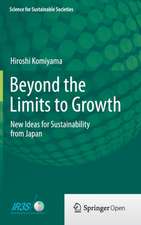GHG Emissions and Economic Growth: A Computable General Equilibrium Model Based Analysis for India: India Studies in Business and Economics
Autor Barun Deb Pal, Vijay P. Ojha, Sanjib Pohit, Joyashree Royen Limba Engleză Hardback – 9 oct 2014
| Toate formatele și edițiile | Preț | Express |
|---|---|---|
| Paperback (1) | 359.64 lei 39-44 zile | |
| Springer India – 23 aug 2016 | 359.64 lei 39-44 zile | |
| Hardback (1) | 372.98 lei 39-44 zile | |
| Springer India – 9 oct 2014 | 372.98 lei 39-44 zile |
Din seria India Studies in Business and Economics
- 18%
 Preț: 734.27 lei
Preț: 734.27 lei -
 Preț: 361.77 lei
Preț: 361.77 lei - 18%
 Preț: 1006.24 lei
Preț: 1006.24 lei - 18%
 Preț: 952.89 lei
Preț: 952.89 lei - 20%
 Preț: 883.20 lei
Preț: 883.20 lei -
 Preț: 186.41 lei
Preț: 186.41 lei - 15%
 Preț: 636.94 lei
Preț: 636.94 lei - 15%
 Preț: 647.27 lei
Preț: 647.27 lei - 15%
 Preț: 646.30 lei
Preț: 646.30 lei -
 Preț: 409.89 lei
Preț: 409.89 lei -
 Preț: 389.88 lei
Preț: 389.88 lei - 18%
 Preț: 894.03 lei
Preț: 894.03 lei - 15%
 Preț: 644.30 lei
Preț: 644.30 lei - 15%
 Preț: 528.30 lei
Preț: 528.30 lei - 15%
 Preț: 643.65 lei
Preț: 643.65 lei - 15%
 Preț: 644.82 lei
Preț: 644.82 lei - 15%
 Preț: 660.37 lei
Preț: 660.37 lei -
 Preț: 386.00 lei
Preț: 386.00 lei - 20%
 Preț: 559.74 lei
Preț: 559.74 lei - 15%
 Preț: 643.99 lei
Preț: 643.99 lei -
 Preț: 386.68 lei
Preț: 386.68 lei -
 Preț: 390.08 lei
Preț: 390.08 lei -
 Preț: 365.76 lei
Preț: 365.76 lei -
 Preț: 393.52 lei
Preț: 393.52 lei - 15%
 Preț: 656.74 lei
Preț: 656.74 lei - 24%
 Preț: 699.22 lei
Preț: 699.22 lei -
 Preț: 369.80 lei
Preț: 369.80 lei - 15%
 Preț: 642.68 lei
Preț: 642.68 lei -
 Preț: 388.90 lei
Preț: 388.90 lei - 15%
 Preț: 649.87 lei
Preț: 649.87 lei - 15%
 Preț: 645.28 lei
Preț: 645.28 lei -
 Preț: 372.66 lei
Preț: 372.66 lei -
 Preț: 389.17 lei
Preț: 389.17 lei - 20%
 Preț: 569.00 lei
Preț: 569.00 lei - 15%
 Preț: 641.85 lei
Preț: 641.85 lei -
 Preț: 392.97 lei
Preț: 392.97 lei - 15%
 Preț: 643.84 lei
Preț: 643.84 lei - 24%
 Preț: 656.29 lei
Preț: 656.29 lei - 15%
 Preț: 651.34 lei
Preț: 651.34 lei - 15%
 Preț: 641.53 lei
Preț: 641.53 lei - 15%
 Preț: 640.37 lei
Preț: 640.37 lei - 20%
 Preț: 569.85 lei
Preț: 569.85 lei
Preț: 372.98 lei
Nou
Puncte Express: 559
Preț estimativ în valută:
71.39€ • 74.25$ • 59.82£
71.39€ • 74.25$ • 59.82£
Carte tipărită la comandă
Livrare economică 10-15 martie
Preluare comenzi: 021 569.72.76
Specificații
ISBN-13: 9788132219422
ISBN-10: 8132219422
Pagini: 204
Ilustrații: XXI, 182 p. 17 illus., 14 illus. in color.
Dimensiuni: 155 x 235 x 17 mm
Greutate: 0.47 kg
Ediția:2015
Editura: Springer India
Colecția Springer
Seria India Studies in Business and Economics
Locul publicării:New Delhi, India
ISBN-10: 8132219422
Pagini: 204
Ilustrații: XXI, 182 p. 17 illus., 14 illus. in color.
Dimensiuni: 155 x 235 x 17 mm
Greutate: 0.47 kg
Ediția:2015
Editura: Springer India
Colecția Springer
Seria India Studies in Business and Economics
Locul publicării:New Delhi, India
Public țintă
ResearchCuprins
Chapter 1: Economic Growth and GHG emissions: Policy Perspective from past Indian studies.- Chapter 2: Social Accounting Matrix of India: Concepts and Construction.- Chapter 3: Environmentally Extended Social Accounting Matrix of India: Definition and Construction Methodology.- Chapter 4: Impact of Economic Growth on GHG emissions - SAM Multiplier Analysis.- Chapter 5: GHG Emissions in India- A Structural Decomposition Analysis.- Chapter 6: An Environmental CGE Model for India.- Chapter 7: Reference and Policy Scenarios of CGE Model.- Chapter 8: Policy Message for Mitigating India’s GHG emissions.
Notă biografică
Dr. Barun Deb Pal is currently an Assistant Professor at the Institute of Social and Economic Change, Bangalore. He has been working in the field of SAM based CGE modelling for the last 7 years. He has also worked on climate-smart agriculture and land-use planning models for South Asia as a key researcher at the International Food Policy Research Institute (IFPRI). He has a long professional affiliation with the National Council of Applied Economic Research (NCAER), working on climate change CGE modeling. He has published papers in journals of international repute with one of his publication being “A Social Accounting Matrix for India”, published in 2012 in Economic Systems Research (Taylor and Francis). His current areas of research interest include various developmental issues and their linkages with climate change, low carbon agriculture, Infrastructure and public utility pricing.
Dr. Vijay P Ojha is a Professor of Economics at the Institute of Management Technology, Ghaziabad, India. A Computable General Equilibrium modeler (CGE) by training, he employed the CGE modeling technique to analyze the trade-offs among carbon emissions, economic growth and poverty reduction in India while tenuring as a post-doctoral Commonwealth Fellow at the Environment Department, University of York, United Kingdom in 2004. Ever since, he has been working on climate-change issues using the CGE modeling methodology. He has authored many published reports and academic journal papers His most recent publications are in the Journal of Policy Modeling (Elsevier) and Environment and Development Economics (Cambridge University Press).
Dr. Sanjib Pohit is presently working as a Senior Principal Scientist, Senior Fellow at the National Institute of Science, Technology & Development Studies (CSIR). He was educated at the Indian Statistical Institute. Previously, he held research positions (Senior Fellow/Chief Economist) at the National Council for Applied Economic Research, New Delhi and the Indian Statistical Institute and was also a visiting scholar at the University of Michigan (Ann Arbor, USA) and the Conference Board of Canada. Dr. Pohit has been a member of several committees of the Government of India and a Council Member of the Gerson Lehman group. He has been a consultant to various national and international bodies, including The World Bank, Asian Development Bank, The Energy & Resource Institute, OECD, CUTS, Price Waterhouse Coopers, ICRIER and RIS (New Delhi). Dr. Pohit is an experienced modeler in the area of trade and environment with 20 years of modeling experience. He has he worked in the area of institutional economics, transport economics, input-output models, FDI, informal trade, the automobile industry and South Asian integration. He has co-authored 6 books, and has published more than 100 articles in journals/books. He has presented his research at seminars and conferences in different parts of the world – Japan, Canada, USA, India, Bangladesh, Switzerland, the Netherlands, Singapore and Finland.
Dr. Joyashree Roy, an ICSSR National Fellow, is currently a Professor of Economics at Jadavpur University, Kolkata, India. Additionally, she coordinates the Global Change Programme and also directs the Ryoichi Sasakawa Young Leaders Fellowship Fund Project at Jadavpur University. In 2007 she was on the Nobel Peace Prize winning panel –IPCC (Intergovernmental panel on climate change). She has been involved in preparation of Stern Review Report, Global Energy Assessment and many other national and global reports. She has published more than 70 peer-reviewed articles in journals of national and international repute. Her research interests are in resource and environmental economics, particularly in the field of energy demand modelling, economic assessment of application of non-renewable and renewable resources for urban and rural problems, economic and social dimensions of climate change, water resource management and multidisciplinary research on sustainable development, sustainability transition, ecosystem services in the context of coastal ecosystem.
Dr. Vijay P Ojha is a Professor of Economics at the Institute of Management Technology, Ghaziabad, India. A Computable General Equilibrium modeler (CGE) by training, he employed the CGE modeling technique to analyze the trade-offs among carbon emissions, economic growth and poverty reduction in India while tenuring as a post-doctoral Commonwealth Fellow at the Environment Department, University of York, United Kingdom in 2004. Ever since, he has been working on climate-change issues using the CGE modeling methodology. He has authored many published reports and academic journal papers His most recent publications are in the Journal of Policy Modeling (Elsevier) and Environment and Development Economics (Cambridge University Press).
Dr. Sanjib Pohit is presently working as a Senior Principal Scientist, Senior Fellow at the National Institute of Science, Technology & Development Studies (CSIR). He was educated at the Indian Statistical Institute. Previously, he held research positions (Senior Fellow/Chief Economist) at the National Council for Applied Economic Research, New Delhi and the Indian Statistical Institute and was also a visiting scholar at the University of Michigan (Ann Arbor, USA) and the Conference Board of Canada. Dr. Pohit has been a member of several committees of the Government of India and a Council Member of the Gerson Lehman group. He has been a consultant to various national and international bodies, including The World Bank, Asian Development Bank, The Energy & Resource Institute, OECD, CUTS, Price Waterhouse Coopers, ICRIER and RIS (New Delhi). Dr. Pohit is an experienced modeler in the area of trade and environment with 20 years of modeling experience. He has he worked in the area of institutional economics, transport economics, input-output models, FDI, informal trade, the automobile industry and South Asian integration. He has co-authored 6 books, and has published more than 100 articles in journals/books. He has presented his research at seminars and conferences in different parts of the world – Japan, Canada, USA, India, Bangladesh, Switzerland, the Netherlands, Singapore and Finland.
Dr. Joyashree Roy, an ICSSR National Fellow, is currently a Professor of Economics at Jadavpur University, Kolkata, India. Additionally, she coordinates the Global Change Programme and also directs the Ryoichi Sasakawa Young Leaders Fellowship Fund Project at Jadavpur University. In 2007 she was on the Nobel Peace Prize winning panel –IPCC (Intergovernmental panel on climate change). She has been involved in preparation of Stern Review Report, Global Energy Assessment and many other national and global reports. She has published more than 70 peer-reviewed articles in journals of national and international repute. Her research interests are in resource and environmental economics, particularly in the field of energy demand modelling, economic assessment of application of non-renewable and renewable resources for urban and rural problems, economic and social dimensions of climate change, water resource management and multidisciplinary research on sustainable development, sustainability transition, ecosystem services in the context of coastal ecosystem.
Textul de pe ultima copertă
Issues linking climate change and economic growth are now at the centre of discussions regarding development strategies especially in the context of developing countries. This book contributes by analyzing the relationship between economic growth and GHG emissions in India with explicit reference to all major economic sectors. One of the most popular tools for macroeconomic policy analysis is Social Accounting Matrix (SAM). The book presents the methods and estimates of the latest Social Accounting Matrix (SAM) for India, which provides a major data base describing the complete circular flow of income and input-output transactions among the sectors of the economy. The novelty of the book lies in the fact that for the first time a SAM has been prepared for the Indian economy with environmental indicators. A detailed methodology for constructing such an extended SAM is also presented in the book. The environmental social accounting matrix (ESAM) based analysis has been included to show direct and indirect links between economic growth and GHG emissions. The book also includes analysis of factors affecting historical GHG emissions trends in India. The book goes beyond SAM and applies computable general equilibrium (CGE) modelling to derive climate-change policy analysis and simulations. This CGE-based analysis is an important contribution to the current debate surrounding carbon tax and its possible impact on macroeconomic growth.
Caracteristici
Emphasis on integration of economic activity with the environment in an accounting framework Explores an environmentally extended social accounting matrix (ESAM) for the Indian economy Presents a detailed mathematical construction of a computable general equilibrium (CGE) model capable of making assessments of the effectiveness of climate mitigation policies and their impact on macro-economic parameters Includes supplementary material: sn.pub/extras
